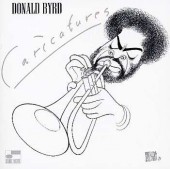In the early '70s, Byrd perfected a bright, breezy, commercially potent take on fusion that was distinct from Miles Davis, incorporating tighter arrangements and more of a smooth soul influence. Opinions on this phase of Byrd's career diverge wildly jazz purists utterly despised it, branding Byrd a sellout and the records a betrayal of talent, but enraptured jazz-funk fans regard it as some of the most innovative, enduring work of its kind. In fact, proportionately speaking, Byrd is held in even higher esteem by that audience than by straight-ahead jazz fans who enjoy his hard bop output. Byrd truly came into his own as a fusion artist when he hooked up with brothers Larry and Fonce Mizell, who began to handle production, writing, and some musical support duties. Their first collaboration was 1972's Black Byrd, an upbeat, funky blend of jazz and R&B. Jazz critics detested the album and called Byrd all sorts of names, but the record was a smash hit; it became the biggest seller in Blue Note history, and just missed hitting number one on the R&B albums chart. In the wake of its success, Byrd formed a supporting group, the Blackbyrds, who were culled from the cream of his music students at Howard University and recorded through the rest of the '70s. Byrd went on to release a string of successful LPs in partnership with the Mizell Brothers, including the imaginary blaxploitation soundtrack Street Lady (1974), Stepping into Tomorrow (1975), the much-lauded Places and Spaces (1976), and Caricatures (1977). All made the Top Ten on the R&B album charts, and the Places and Spaces single "Change (Makes You Wanna Hustle)" even got substantial play in discotheques. Jazz-funk fans revere this period in general, but usually reserve their highest praise for Street Lady and, especially, Places and Spaces. As a side note to his musical career, Byrd finished law school in 1976, and went on to teach at North Carolina Central University.Following Caricatures, Byrd parted ways with Blue Note and the Mizell Brothers and moved to Elektra. He recorded several albums over 1978-1983, but even the most commercially successful, 1978's Thank You.for F.U.M.L. (Funking up My Life), didn't match the infectiousness of his Blue Note jazz-funk outings. In 1982, Byrd received his Ph.D. from Columbia Teachers College. He spent a few years in the mid-'80s away from recording, due in part to ill health, but continued to teach, moving on to North Texas State and Delaware State. In the late '80s and early '90s, Byrd returned to the hard bop of his early days on several sessions for the Landmark label. He participated in rapper Guru's Jazzmatazz project in 1993, and with the advent of the jazz-rap movement and England's acid jazz revival, his '70s albums became hugely popular sources for samples. In the meantime, Byrd continued his activities as a jazz educator.
